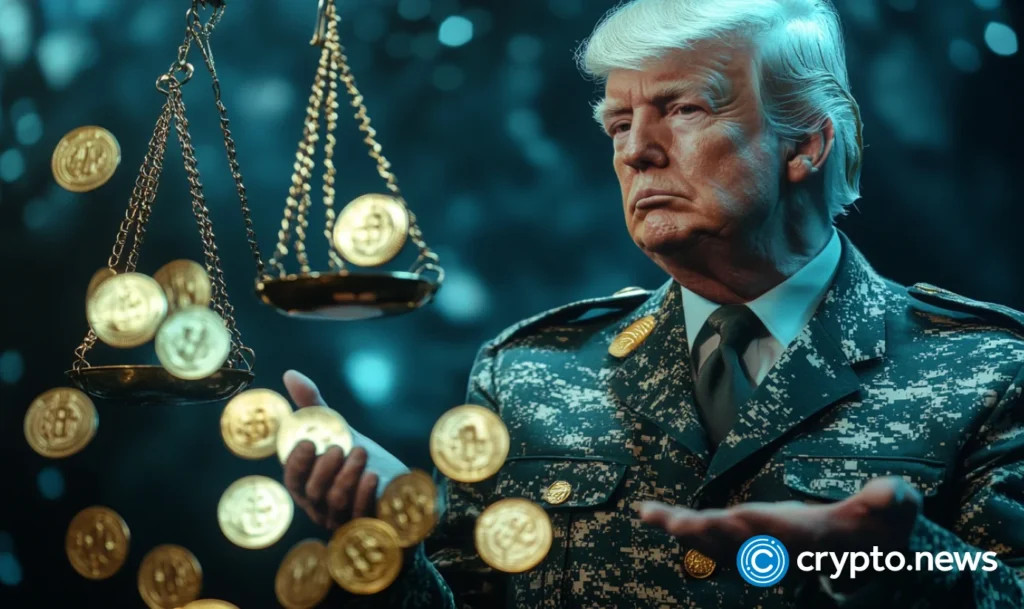Donald Trump’s decision to pardon former Binance chief CZ has ignited controversy, with critics calling it “disgusting” and questioning the links between politics and crypto.
- Trump granted a full pardon to Binance founder CZ, erasing his money-laundering conviction.
- Reports reveal business links between Trump-affiliated firms and Binance entities, fueling concerns of collusion in the pardon process.
- Critics, including investor Adam Cochran, called the move “disgusting even for Trump,” accusing both sides of pay-for-crime politics.
- The pardon marks a new precedent in crypto regulation, showing how political power can reshape outcomes for convicted industry leaders.
Table of Contents
Trump grants full pardon to CZ
On Oct. 23, U.S. President Donald Trump granted a full and unconditional pardon to Changpeng Zhao, known as CZ, the founder and former chief executive of Binance.
Binance remains the world’s largest crypto exchange by trading volume, often processing tens of billions of dollars in trades every day.
CZ’s pardon followed years of scrutiny from American regulators who accused Binance of violating anti-money-laundering laws and facilitating transactions involving sanctioned entities.
U.S. agencies had been conducting parallel investigations since at least 2021. In November 2023, the Treasury Department’s Financial Crimes Enforcement Network and Office of Foreign Assets Control jointly announced that Binance had violated the Bank Secrecy Act and U.S. sanctions by allowing trades connected to terrorist groups and restricted jurisdictions.
The Department of Justice stated that Binance “turned a blind eye to its legal obligations in the pursuit of profit,” enabling illicit funds to move through the platform.
In November 2023, CZ personally pleaded guilty to failing to maintain an effective anti-money-laundering program, a felony under the Bank Secrecy Act. He resigned as CEO and agreed to pay a $50 million fine.
Binance itself also pleaded guilty to criminal charges that included conspiracy to violate the same law, operating as an unlicensed money-transmitting business, and breaching the International Emergency Economic Powers Act.
The company’s settlement with U.S. authorities reached $4.3 billion in penalties, one of the largest in corporate criminal history. In April 2024, CZ was sentenced to four months in prison and was released in September 2024 after serving his term.
Trump has previously used his clemency powers in cases related to digital assets. On Jan. 21, he pardoned Ross Ulbricht, the founder of Silk Road, a darknet marketplace that enabled over $200 million in Bitcoin (BTC) based illegal transactions.
The road to the pardon
Public talk of a possible presidential pardon for CZ began circulating in early 2025. The discussions first surfaced on social media and crypto-industry forums, where speculation grew that Trump’s team was informally exploring clemency for the Binance founder.
The rumors, initially dismissed as chatter, gained traction when credible media outlets began reporting on behind-the-scenes developments.
In March 2025, The Wall Street Journal reported that members of Trump’s family had been in contact with representatives from Binance and that CZ was seeking a presidential pardon.
Two months later, in May 2025, CZ confirmed that his team had formally submitted a pardon request. He explained that while he had previously denied ongoing discussions, the official request had been filed in late March or early April.
Soon after, on May 14, several U.S. senators, including Elizabeth Warren, sent a letter to the DOJ and the White House demanding transparency.
The letter requested documentation related to any communications about the pardon and pointed to the potential conflict between CZ’s conviction, his continued ownership interests in Binance, and his appeal for clemency.
In October 2025, reports again emerged that the White House was “reportedly considering” granting a pardon to CZ. These developments came amid growing news coverage of his case.
The pardon was officially announced on Oct. 23, a day after it was signed. The White House statement described President Trump’s decision as an exercise of constitutional authority and presented the move as a correction to what it called “prosecution by the Biden administration in their war on cryptocurrency.”
On the same day, Senator Elizabeth Warren publicly condemned the decision, arguing that CZ had pleaded guilty to a money-laundering charge, funded Trump’s stablecoin initiative, and lobbied for clemency.
She warned that if Congress failed to act against such exchanges of influence, it would be complicit in normalizing corruption.
Binance-linked deals surface after CZ pardon
The story of CZ’s pardon did not end with a White House statement. Adam Cochran, a well-known Ethereum (ETH) investor and venture capitalist, accused Trump and CZ of coordinated collusion.
In a detailed thread on X, he called Trump’s decision “disgusting even for Trump” and claimed that CZ had allowed groups such as Hamas and Wagner to use Binance.
Cochran alleged that Binance later partnered with Trump’s company, World Liberty Financial (WLFI), to launch a new stablecoin, collaborated with Dominari Holdings, a firm linked to Trump’s sons operating out of Trump Tower, and invested in those ventures through YZi Labs.
He concluded that the timing of the pardon was “the clearest case yet of pay-for-crime.” Cochran’s post gained traction because his claims aligned with a timeline supported by public filings and official disclosures.
The first major link appeared in April 2025, when World Liberty Financial, founded by Donald Trump and his sons, announced a dollar-pegged stablecoin named USD1 (USD1), claiming it would be fully backed by U.S. Treasuries and cash equivalents.
Company documents showed that USD1 would operate on both Ethereum and Binance Smart Chain, effectively embedding it within Binance’s infrastructure.
In May 2025, reports emerged that Abu Dhabi-based MGX Fund Management Limited planned to use USD1 to execute a $2 billion investment in Binance.
Zach Witkoff, co-founder of World Liberty Financial, described the deal as “a strategic vote of confidence in Binance and in the U.S.-linked stablecoin ecosystem.”
The transaction brought together three entities, the Trump family’s crypto venture, a foreign sovereign-fund-linked investor, and Binance itself.
The arrangement quickly drew congressional attention. In June 2025, Senators Elizabeth Warren and Jeff Merkley sent letters to both MGX and Binance, stating that “President Donald Trump and his family are financially linked to World Liberty Financial, meaning that the President stands to benefit from your companies’ use of USD1 in this transaction.”
The correspondence formally established that the sitting president’s family could profit from a multibillion-dollar deal involving Binance.
Further connections appeared in October 2025, when Bloomberg Law reported that a subsidiary of Dominari Holdings Inc., a New York-based investment firm with known ties to Trump’s sons, Eric Trump and Donald Trump Jr., had entered a partnership with a blockchain project backed by CZ’s family office.
According to the report, the partnership aimed to develop infrastructure for digital assets and exchange-traded funds. The project, called the Hemi blockchain, was described as a Bitcoin-programmability network.
Dominari Securities, a subsidiary of Dominari Holdings, made a “strategic investment” in Hemi, while both entities planned to jointly roll out a digital-asset treasury and ETF platform.
Bloomberg noted that Dominari operates out of Trump Tower, counts the Trump sons in advisory or ownership roles, and is commonly referred to as “Trump linked,” creating another connection between Trump affiliated businesses and CZ related entities.
No public record confirms a direct exchange of favors, but the overlapping business relationships and the pardon that followed have drawn criticism from both policymakers and industry observers who argue that the sequence of events blurs the line between political power and financial interest.
A new precedent in crypto pardons
The presidential pardon closes CZ’s legal chapter but reopens questions about his corporate future. His resignation from Binance in November 2023 was part of the plea agreement with the DOJ, which required him to step down as chief executive after admitting to violations of the Bank Secrecy Act.
Now that the conviction has been erased, no legal barriers remain preventing CZ from rejoining Binance or taking a leadership role in related ventures.
Any potential return would depend on the company’s board and on regulators in jurisdictions where Binance operates, particularly in markets that maintain active oversight of its compliance framework.
The pardon sets a procedural precedent for the digital-asset industry, showing that presidential clemency can extend beyond personal relief to reshape the professional prospects of high-profile figures previously convicted in financial-crime cases.



